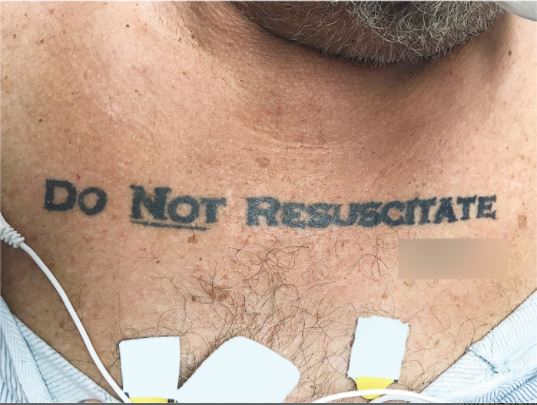
Man's Unusual 'Do Not Resuscitate' Tattoo Sparks Ethics Debate

It's not often that a sentiment expressed in a tattoo would influence a person's medical care, but that's what happened to a man in Florida who had the words "do not resuscitate" tattooed across his chest.
The 70-year-old man arrived at the hospital unconscious with an elevated blood alcohol level, according to a recent report of the case. He had a history of several chronic diseases, including chronic obstructive pulmonary disease (COPD), diabetes and an irregular heartbeat.
The "do not resuscitate" tattoo was written in all capital letters and with the word "not" underlined. This tattooed statement was also accompanied by what appeared to be the man's signature, which has been blurred in the photograph.
"Do not resuscitate" (DNR) is a legal order, which usually requires written paperwork, that prevents doctors from performing cardiopulmonary resuscitation (CRP) or providing advanced life support if a patient's heart stops beating.
His doctors were at odds over how to handle the case. They initially decided not to honor the tattoo because they were uncertain if the tattoo truly expressed the man's wishes. Indeed, there is at least one previous report of a man with a "DNR" tattoo that did not reflect his wishes. In that case, which was reported in 2012, the man did want to be resuscitated, but he got the DNR tattoo because he lost a bet. [5 Weird Ways Tattoos Affect Your Health]
But in the new case, the man's doctors were conflicted about the decision not to honor the tattoo, because of "the patient's extraordinary effort to make his presumed advance directive known."
So they consulted a medical ethics expert, who advised the doctors to honor the patient's tattoo. The expert "suggested that it was most reasonable to infer that the tattoo expressed an authentic preference," the report said.
Get the world’s most fascinating discoveries delivered straight to your inbox.
Later, the hospital found that the man actually did have an official DNR order with the Florida Department of Health. The man's doctors were "relieved" to find that their decision matched this official request.
The man's condition soon deteriorated, and he died without undergoing CPR or invasive life-support methods.
The doctors conclude that "this patient’s tattooed DNR request produced more confusion than clarity," and that the case "neither supports nor opposes the use of tattoos to express end-of-life wishes."
The report was published Nov. 30 in the New England Journal of Medicine.
Original article on Live Science.

Rachael is a Live Science contributor, and was a former channel editor and senior writer for Live Science between 2010 and 2022. She has a master's degree in journalism from New York University's Science, Health and Environmental Reporting Program. She also holds a B.S. in molecular biology and an M.S. in biology from the University of California, San Diego. Her work has appeared in Scienceline, The Washington Post and Scientific American.
 Live Science Plus
Live Science Plus





